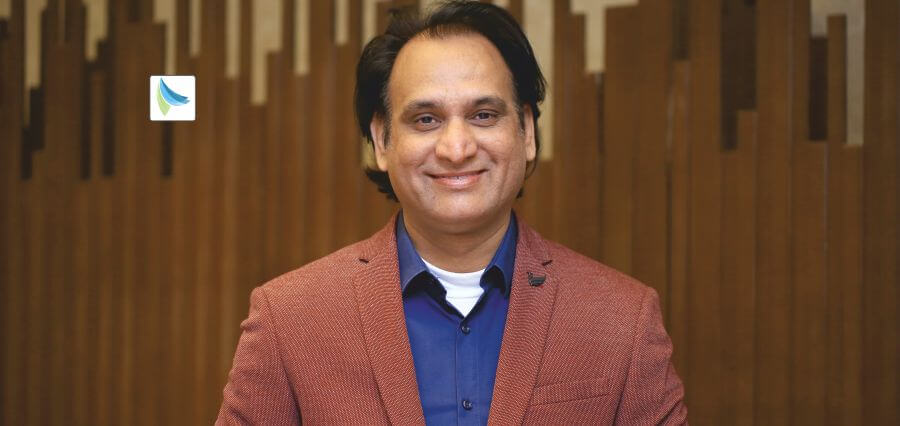The universal hum of ambition resonates within us all. From the first spark of an idea to the grandest aspirations, we as humans are propelled by the desire to climb, to achieve, to reach that shimmering horizon of success. Yet, for all the striving, only a select few truly make it to the pinnacle. What sets them apart? It’s more than just effort; it’s a profound commitment and the vision to develop powerful frameworks that transform dreams into tangible realities. This thought has been a catalyst for Vinod Bhatt, Head of Supply Chain, HP (India).
Vinod’s career began in 1994 with a clear intent—to build operational frameworks that drive sustainable business advantage. He was drawn to operational disciplines because they have a unique ability to transform business strategy into real, measurable outcomes. Early experiences at Unilever, LG, Hughes Telecom, and Nortel Networks helped shape his understanding of end-to-end supply chain management in fast-paced, dynamic industries.
The defining phase of his career began when he joined HP in 2007. Beyond the global scale and brand stature, what stood out immediately was HP’s deep-rooted culture of transformation. He shares, “I had the privilege of contributing to several pivotal milestones in HP’s history—from large-scale acquisitions and strategic integrations—reshaping our global supply chain from a regional construct to a market-centric model.” He drives HP India’s commitment to customer-centricity and operational excellence.
The Ideology that Defines the True Meaning of Leadership
More recently, Vinod has led teams through the transformation journey towards a digitally enabled, customer-first operating model anchored in resilience and sustainability—key pillars of HP’s growth strategy and competitive edge. He remains truly inspired by HP’s purpose-driven ethos and values-based leadership, committed not only to driving profitable growth but also to creating long-term value for the planet and people. In essence, these experiences reaffirmed Vinod’s belief that supply chain is far more than an operational backbone—it is a strategic engine powering resilience, growth, and customer experience. That belief continues to fuel his commitment to this profession.
Vinod’s leadership philosophy emphasizes the fundamentals of
- Always Accountable
- Best in Class
- Competitive Spirit
These principles serve as a compass that guides not only day-to-day operations but also drives tactical and strategic decisions to bring value to the business. Vinod reflects HP’s core leadership values: Start with the customer, develop the team, own the outcome. He expresses, “My leadership philosophy is rooted in transformation: not just setting the standard through personal example but cultivating leadership within the team. To me, true leadership transcends hierarchy; it’s about clarity of purpose, empowering individuals to take ownership of their journey, and fostering an environment where people can thrive.” Vinod is a firm believer in the ethos of “Doing it Right rather than Right Now.”
He understands that thoughtful and integrity-driven decisions matter more than short-term wins. At HP, while the leadership structure has evolved, the behaviors and values remain enduring and ingrained in the company culture, which has profoundly shaped his career path.
He has led pivotal initiatives such as driving HP India’s Customer-Centricity principle across the supply chain, embedding agility, responsiveness, and end-user alignment into core operations. Under his leadership, the supply chain has been positioned as a strategic growth enabler—through close collaboration with Sales to influence customer decision-making and drive business wins.
He has also played a key role in enhancing customer visibility into HP’s global scale, operational resilience, and sustainability impact. “For us, it is not just about products, but how those products go into the hands of customers in a completely sustainable manner – via an entire sustainable supply chain of green warehouses and low carbon emission options,” shares Vinod.
Throughout this journey, he has drawn inspiration from leaders who emphasized continuous learning, bold thinking, and the ability to convert operational capabilities into strategic advantage—principles that continue to inform his leadership approach today.
Comprehensive Fundamentals Behind the Scenes
From Vinod’s perspective, supply chain management has decisively transformed from being a traditional support function to a strategic differentiator in today’s business landscape, focusing on agility, resilience and sustainable value creation across the enterprise. In an environment marked by extreme volatility, geopolitical & macroeconomic challenges, and constantly evolving consumer expectations, an agile and resilient supply chain is essential to deliver on brand reliability, profitable growth, and best-in-class customer experience.
He elaborates on the fact that, “At HP, the supply chain has played a pivotal role in sustaining operational continuity during global disruptions and overcoming those challenges to deliver on operational excellence and customer promise. Today, a high-performing supply chain isn’t one that merely responds to challenges; it’s one that anticipates risks, capitalizes on opportunities, and positions the organization to deliver consistently on its business priorities and customer commitments.”
A Vital Leadership Trait
“Resilience isn’t built overnight—it’s an intentional, structural commitment, and it cannot be improvised during a crisis, shares Vinod, and further adds, “Resilience frameworks pivot on several key strategies:
- De-risking geographical and supplier concentration to reduce over-reliance on specific nodes
- Balancing working capital efficiency with resilience — optimizing inventory buffers, strategic stocking, and agile inventory practices
- Building real-time e2e visibility through integrated data ecosystems connecting suppliers, logistics partners, and customers
- Forging strategic supplier partnerships for mutual resilience and collaborative crisis response
- Adopting agile fulfilment models, including regional hubs, cross-docking, and multi-modal options
- Embedding organizational resilience through structured crisis management frameworks, resilience KPIs, and business continuity playbooks.”
HP’s leadership team embodies this ideology, enabling the company to proactively navigate volatility while ensuring operational continuity through a multi-layered strategy, driving agility and resilience as core levers of business impact.
Leveraging the Emerging Trends of Technology
Emerging technologies are fundamentally re-architecting how supply chains operate and create value. It’s no longer about incremental improvements—it’s about enabling structural shifts in resilience, agility, sustainability and customer-centricity.
Key areas undergoing this significant transformation include optimizing resource management, where digital platforms help organizations use resources more efficiently and keep better track of products throughout the supply chain. Furthermore, the application of predictive analytics, heavily reliant on AI and machine learning, enables proactive risk management and more precise capacity planning across diverse systems.
These advancements also extend to operational flows, facilitating digitally enabled movements that contribute to carbon efficiency through optimized routing and automated logistics. Real-time visibility into operational status, whether it’s order fulfillment or service delivery, significantly enhances overall stakeholder confidence. Collectively, these capabilities, driven by the strategic deployment of automation, robotics, and artificial intelligence, are building smarter, faster, and more responsive systems that effectively cater to both business and environmental imperatives.
Always Ahead with People First Approach
The strength of any supply chain lies in the strength of its relationships—both within the organization and with external partners. HP’s team cultivates a relationship-driven, resilience-first culture through:
- Shared KPIs and outcome-based metrics with suppliers to align objectives and jointly own outcomes
- Promoting a ‘One Team’ mindset across global, regional, and functional teams to break down operational silos
- Establishing structured governance forums for collaborative decision-making on strategy, performance, and risk response
- Embedding business continuity planning and crisis response mechanisms collaboratively with partners
Within HP, cross-functional collaboration is institutionalized through integrated business operations reviews, risk management councils, and improvement roadmaps that enable collective problem-solving and innovation.
Balancing Operations: Orchestrating Value in Dynamic Supply Chains
As an experienced leader in the supply chain domain, Vinod reflects upon a very practical scenario: the nuanced decision making involved in balancing operational efficiency and resilience. He expresses, “For us, it comes down to pursuing Value Creation & Experience to Stakeholders.” This guiding principle underscores a strategic approach that extends far beyond mere cost reduction.
He suggests that organizations should build their supply chain strategies around absolute end-to-end customer deliverables, emphasizing resilience, lifecycle costs, and operational scalability. This includes a strong focus on network optimization, ensuring that the entire supply chain infrastructure – from sourcing to distribution – is strategically configured for optimal flow and responsiveness. This comprehensive approach enables organizations to effectively deal with global uncertainties, shifting market demands, and unforeseen disruptions, transforming potential weaknesses into sources of strength.
Facilitating cross-functional engagement and collaboration is also critical to aligning business goals with an optimized cost to-serve. This collaborative model recognizes that every aspect of the supply chain, from initial planning to final delivery, impacts the customer experience.
Ultimately, everything starts and ends with customers – that’s where the supply chain plays its pivotal role. This balanced, collaborative model has consistently enabled Vinod and his team to ensure operational reliability, enhance overall operational efficiency, and maintain robust financial discipline amidst dynamic global conditions.
Not Just a Workplace—A Way of Life
Behind every successful company, a strong intentional culture fosters trust, inclusiveness, and a shared sense of purpose. When culture aligns with strategy, it becomes a powerful driver of performance, innovation, and long-term impact. Vinod acknowledges the fact that ‘Culture isn’t just an enabler—it’s the invisible operating system behind every strategic supply chain outcome.’
Vinod proudly revels, “At HP, our culture prioritizes:
- Customer Centricity: keeping the end customer at the heart of every operational decision
- Operational Resilience and Crisis Readiness: embedding a bias for proactive, agile decision-making
- Continuous Improvement and Innovation: fostering a growth mindset to challenge the status quo and experiment with new ideas
- Transparency, fairness, and Diversity: fostering an inclusive environment where diverse perspectives drive better outcomes.”
HP’s firm commitment to meaningful innovation and sustainability has become a central tenet of its global supply chain strategy. This ethos—anchored in the foundational principles of the HP Way—ensures that supply chain operations are not only efficient but also responsible, future ready, and value-driven. In India, this vision has been translated into aligning the local supply chain with HP’s global sustainability agenda, seamlessly integrating environmental goals into core operations, while consistently meeting customer expectations.
Overcoming the Adversities
Vinod’s observation is that the supply chains are entering a new era. AI-led digital transformation is unlocking predictive, adaptive, and autonomous supply chain capabilities, enabling businesses to respond to disruptions with agility and foresight.
At the same time, regionalization and supply network rebalancing are driving the creation of new operating models that are closer to consumption centers, enhancing responsiveness and reducing lead times. Sustainability is emerging as a competitive advantage, where carbon-efficient, ethical, and transparent supply chains are no longer just good practice—they are becoming key brand differentiators.
In this environment, partner and ecosystem collaboration is proving to be the new strategic advantage, enabling organizations to build more resilient, innovative, and connected supply networks. However, despite the momentum, several challenges continue to test the path forward.
Geopolitical volatility and regulatory unpredictability continue to disrupt global supply networks, forcing organizations to remain agile and vigilant. At the same time, the rise in cybersecurity threats poses serious risks to increasing digital and connected operations. Talent shortages and the urgent need for workforce reskilling are further straining capabilities, especially as supply chains become more technology-driven.
Cost inflation and rising margin pressures demand smarter, leaner operations, while escalating complexity in risk management—fueled by deeply interconnected global systems—requires more sophisticated and proactive approaches.
He expresses, “Navigating this duality of opportunity and risk will define the next-generation supply chain leaders, setting apart those who can adapt with resilience, innovation, and foresight.”
Words of Wisdom
For the budding aspirants of the supply chain niche, Vinod offers advice that is both practical and profound. Stay curious, agile, and resilient—these are not just traits but survival tools in a constantly shifting landscape. Challenge the status quo; don’t just execute — innovate, because true impact lies in creating better ways of doing things.
He urges young professionals to cultivate a cross-functional perspective, reminding them that the supply chain is uniquely positioned at the intersection of planning, procurement, manufacturing, sales, and customer experience. Stay true to your integrity and values, especially when tough decisions arise.
And perhaps most importantly, in every crisis, see opportunity—because in supply chain, the most defining moments are created in disruption. This is a profession where your ability to stay ahead of change doesn’t just support the business—it can redefine its future.
In Reflection of Success: Growth, Grit, and Gratitude
The HP Garage and the story behind it as the “home for innovation” is the inspiration not only for Vinod but for many within and outside this great company.
He bestows, “That spirit continues to resonate within HP and serves as a personal reminder that enduring value is built through integrity, courage, and purpose. What motivates me daily is the opportunity to make a positive impact on business outcomes, customer experiences, and people’s careers.” The commitment to the HP Way—a culture grounded in trust, respect, and responsibility—is what drives Vinod to lead with intention and humility.
Signature on the Sands of Time
For Vinod, a resilient, digitally empowered, sustainably conscious supply chain organization, one recognized not just for operational excellence and strategic foresight, but equally for its deep commitment to people, partnerships, and purpose.
He admits that The HP Way has instilled in him the belief that leadership is about leaving things better than you found them. “That remains my personal leadership promise—to lead with integrity, build with resilience, and empower others to thrive,” concludes Vinod.














